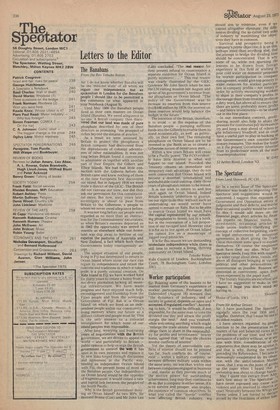Worker participation
gin Pointing some of the lessons to be learned from Germany's experience of worker participation, Professor Ralf Dahrendorf (August 16) stressed that "the dynamics of industry; and of society in general, depends on open and accepted, if regulated, conflict". According to him, "it would be difficult, if not impossible, for the same man to vote the dividend one day and attack the profit margin the next." And you yourself, while welcoming anything which might "enlarge the trade unions' interests and oblige them to share in the_reSponsibility for profits and investments" nearer home, agreed that "all real-life choices involve conflicts of interest".
Yet the theory of unavoidable conflicts of interest should not be pressed too far. Such conflicts do, of course, exist within a military company, or between different military units within 'the same army, no less than within and between companies engaged in business and, insofar as they provide much of the motive power for outstanding achievement, long may they continue to db so. But a company in either sense, if it is 'to survive and prosper, also implies the existence of common objectives. In what you called the "sterile" conflict now affecting British industry, we. should aim to minimise, even if we cannot altogether eliminate, the differences dividing the so-called two sides of industry by maximising the objectives they have in common.
Survival and prosperity being a company's prime objective, it is on this, perhaps more than anything else, that the attempt to bridge the dividing lines should be concentrated. That is why some of us, while not spurning the lessons to be drawn from foreign experience in this field or wishing to pour cold water on domestic proposals for worker participation in comparlY management, would give top priority to wider measures for worker participation in company profits not simply in order, by actively encouraging workers to share in their company's profits, 10 discourage them from treating profits a5 a dirty word, but above all to ensure that there are some, preferably more, profits -and hence investments-to be shared out in the first place. In our immediate context, profitsharing would also help to abate the pressure for continuous pay increases to try and keep a step ahead of others or $the inflationary treadmill, and so cold have a useful part to play in backing UP the Government's own counter-inflationary measures. This makes the freeze on it the present Government inherited from its predecessor seem all the more
counterproductive. W. Grey 12 Arden Road, London N3


































 Previous page
Previous page